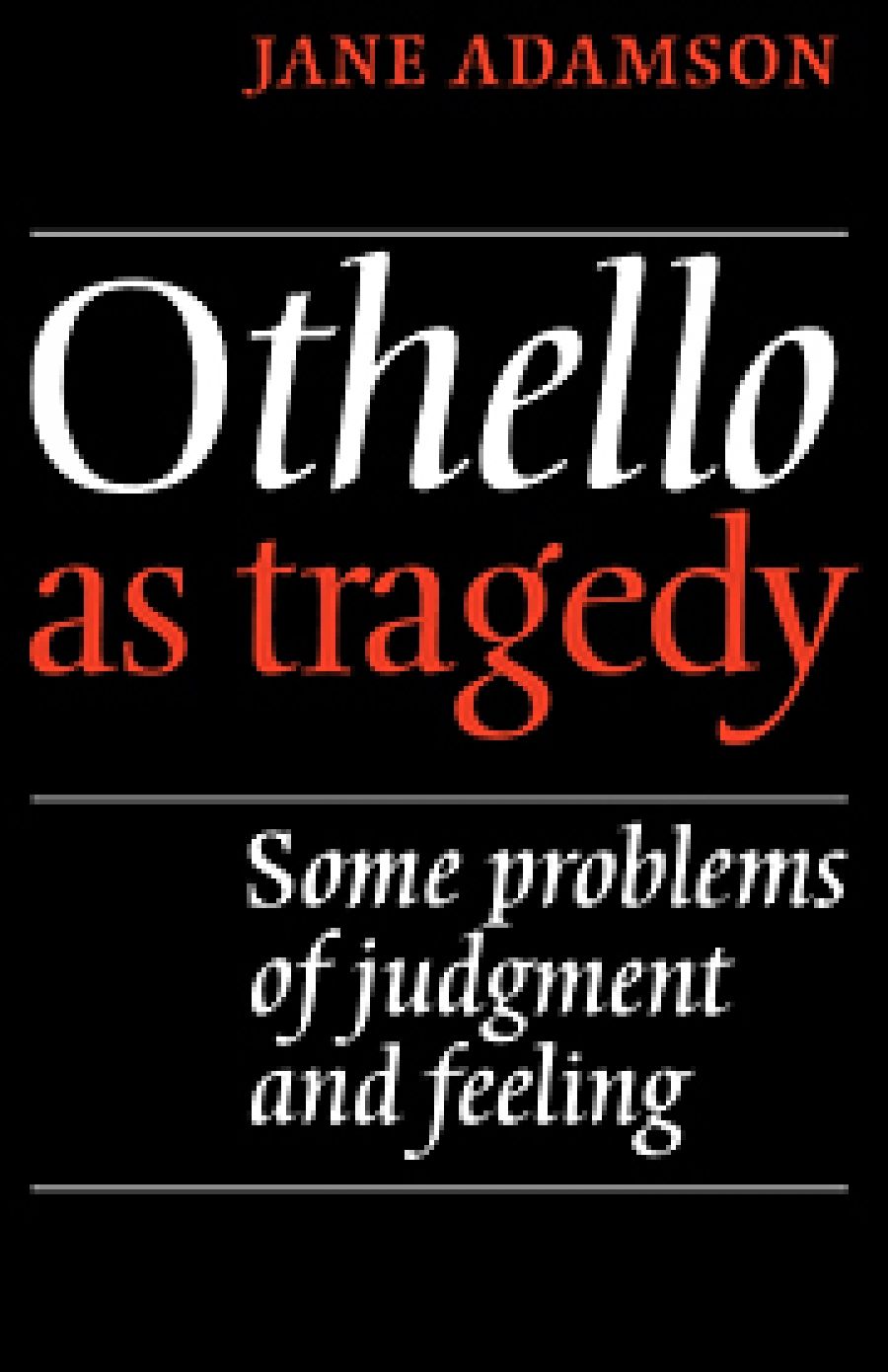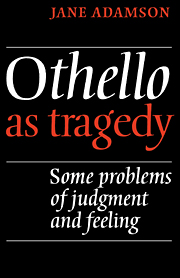
- Free Article: No
- Contents Category: Shakespeare
- Review Article: Yes
- Article Title: Rejecting the Spirit Shrivellers
- Online Only: No
- Custom Highlight Text:
The title of this book accurately represents Jane Adamson’s approach to Othello, her view of the play, and her critical achievement. Rejecting from the outset the ‘conventionalist’ approach, which would have us discount our own responses and treat the play as ‘artificial’, a ‘purely dramatic phenomenon’ (ars gratia artis: the old lie), she bases her critical judgment on a systematic consideration of the feelings it arouses. This leads her to the view that. the connection (or disconnection) between the characters’ feelings and their judgments is at the heart of the play, and at the heart of the tragedy.
- Book 1 Title: Othello as tragedy
- Book 1 Subtitle: Some problems of judgment and feeling
- Book 1 Biblio: Cambridge University Press, 14.25 pb, 301 pp
- Book 1 Cover Small (400 x 600):

Other characters are seen as adopting the same self-protective, self-deceptive, self-corrupting habits of mind, actively misunderstanding themselves and others, but much less thoroughly and plausibly than Iago. Brabantio, for example, maintains that magic must have been used in persuading Desdemona to elope, since he needs to protect himself from having to accept that she voluntarily flouts his will, that she chooses to love Othello.
Othello himself is shown to follow a similar pattern. Because he has committed himself so utterly to love of Desdemona, he has more to lose than any other character (except her), and is most susceptible to fear of losing everything. So, Jane Adamson attributes his susceptibility, and consequent destruction, as much to his emotional generosity as to his culpable weaknesses. While she does not accept A.C. Bradley’s extreme defensive sympathy for Othello, she also disagrees with the ‘anti-Othello’ critics, such as T.S. Eliot and F.R. Leavis. She points out how they, having marked Othello’s habit of ‘self-dramatisation’, pass on with undiscriminating rapidity to such terms as ‘egotism’, ‘self-centredness’, ‘self-idealisation.’, ‘self-regard’, and so on. She more judiciously distinguishes between those moments when he is ‘posturing or role-playing’, and those when he is simply ‘being himself. Most importantly of all, perhaps, in the process of judging the play she brings home with salutary force its overwhelming painfulness: the way envy and calumny and hate reduce Desdemona to paralysed, inactive innocence; the emotional torment which drives Othello to ‘epileptic’ collapse, murder of Desdemona, and suicide.
In concentrating so heavily on the feelings of characters and audience, Jane Adamson runs several risks. Readers may criticise her for emotionalism, or because they think she places herself so close to the drama she cannot see it in proper perspective, or because she gives general application to a personal, even idiosyncratic response. Indeed, she does seem to exaggerate, or over-emphasise, or oversimplify on some occasions. (For example, when she says of Act III, scene iv, that Othello’s professed hatred of Desdemona has no more substance that Iago’s professed love for him: surely it is significant that Othello believes in his hatred, while Iago acknowledges the artificiality of his love?) Her preference for talking about ‘people’ rather than ‘characters’ suggests she has taken her critical stance unusually close to the play. So too does her habit of attributing an insight to ‘us’ rather than herself: it indicates a confusion about the level’ of response she is dealing with. It also, incidentally, takes from her some deserved credit, by presenting as a common, obvious point, an insight that is often the original product of an intelligent mind, after long and deep immersion in the text. But these features of Jane Adamson’s book do not seriously reduce the cogency, fullness and emotional weight of her argument. By a purposeful, connected examination of the detail, she has shown us what she says the play shows us: ‘the pain and misery that can attend on trying to keep one’s heart open to love and so open to being negated . In doing so, she has restored to the play what the spirit-shrivellers and finger-waggers, the Eliots and Leavises, had taken out for many people. One could fairly call her book a critical re-creation, ‘an imitation’, of the tragedy. It is a considerable achievement.


Comments powered by CComment